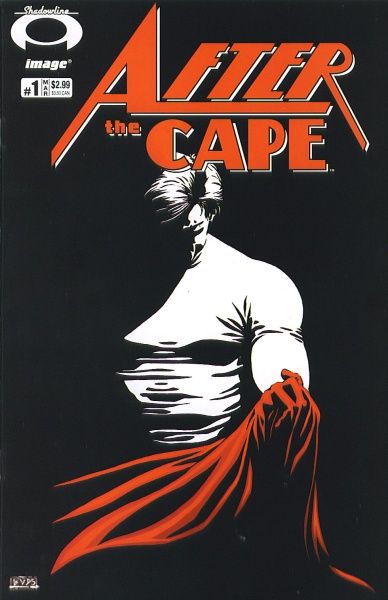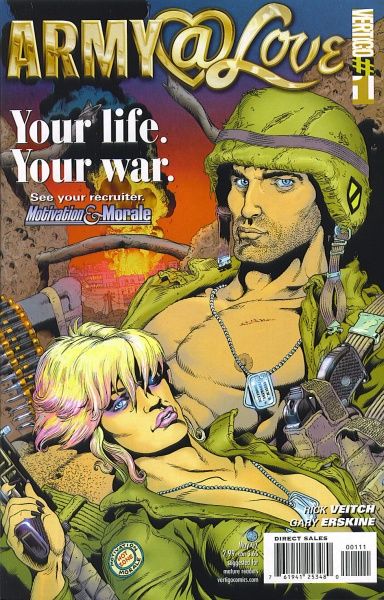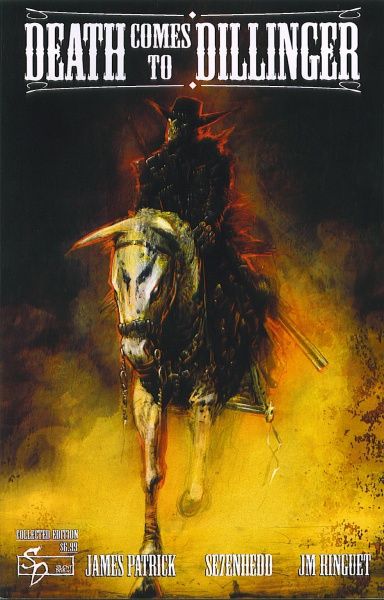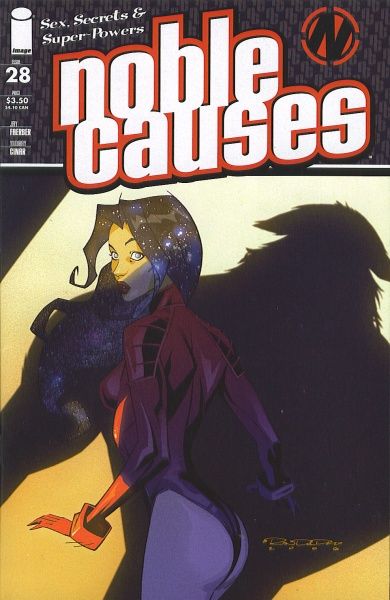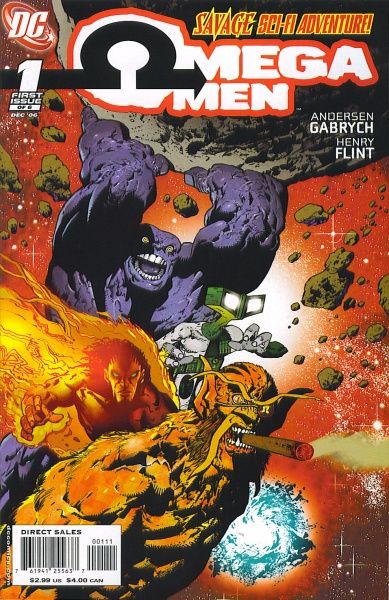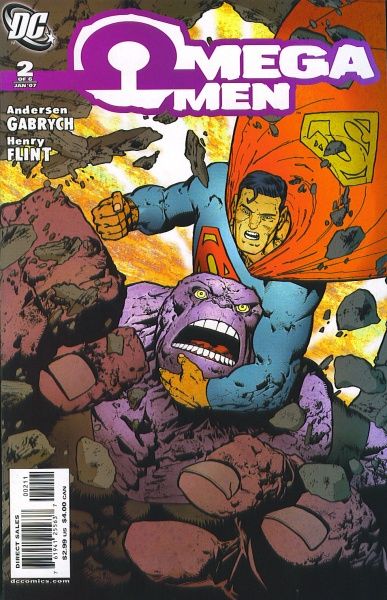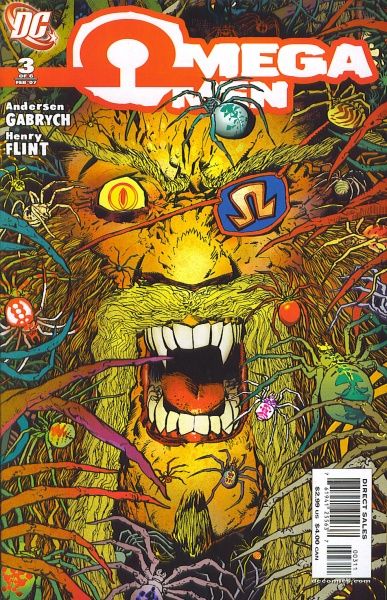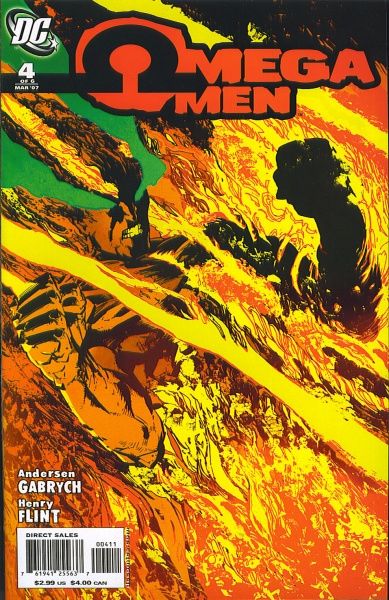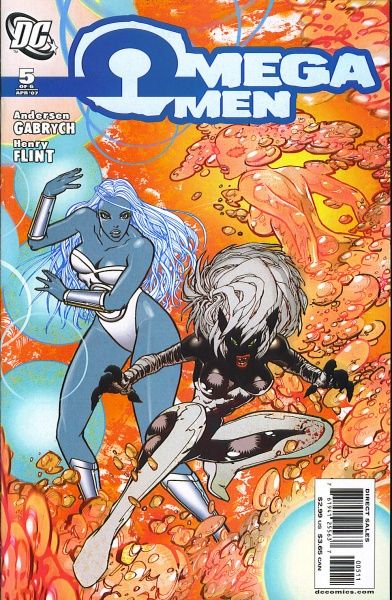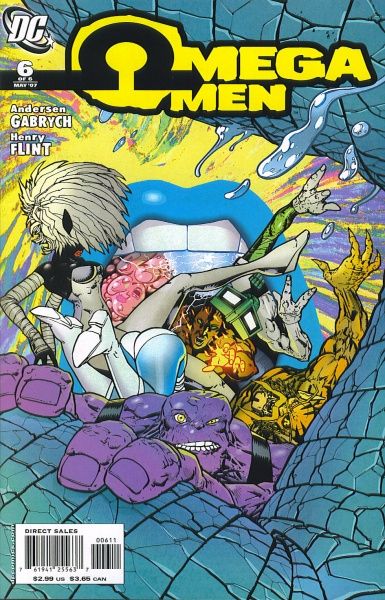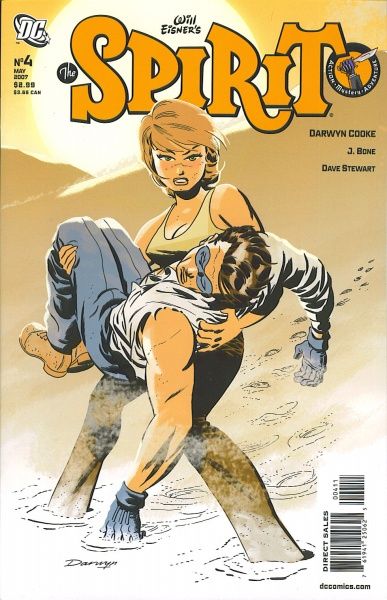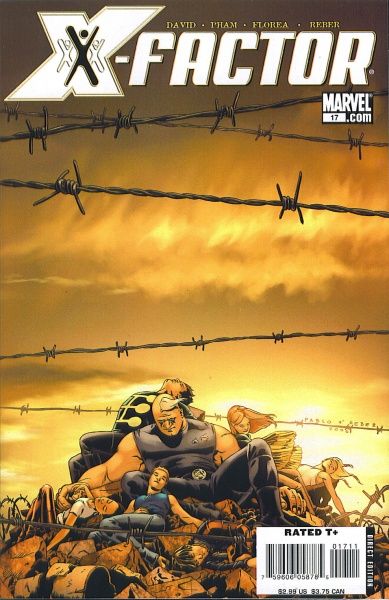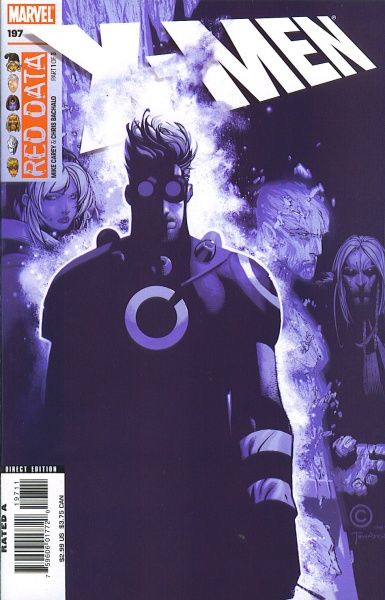It was kind of an odd week in the world of comics. Some very good stuff, but some stuff that made me wonder if I'm just missing the point. Which, of course, I could very well be!
Today is the second anniversary of my ranting at this blog, by the way. I was going to do some sort of anniversary post, and I still might, but I wanted to thank Brian again for inviting me on board. I'm like a cockroach - I'm still here, and nothing you can do can get rid of me! Bwah-ha-ha-ha! So, thanks, Dread Lord and Master. Your plan for world domination continues apace!
Let's hit the books!
After the Cape #1 (of 3) byHoward Wong, Jim Valentino, and Marco Rudy. $2.99, Image/Shadowline.
Boy, this is a neat book. Rudy's art reminds me of Mike McKone's and Bendis', when he drew his own stuff, and for me, that's good, because I like both McKone and Bendis (yes, I like Bendis' art - sue me). The brief superhero scenes are suitably low-key, as this isn't really a superhero book, and Rudy works well with the black-and-white format, effectively using shadows with our hero, Ethan Falls (yes, I hate the last name too), to show his moral breakdown. He also does a nice job giving each character a distinctive look, and the use of gray in the flashbacks is a good touch. Rudy's art gives the comic a gritty feel without sacrificing clean line work, and it's a pleasure to look at each page, which is what art is supposed to do (isn't it?).
The story is nice, too, because Wong and Valentino (Wong scripted, Valentino plotted) give us a hero gone bad, but not in a "Hal-Jordan-goes-mental" kind of way. Heroes going bad is a standard story, but Wong and Valentino give a hero going bad thanks to an all-too-human thing: alcoholism. Ethan is no longer a hero because of his drinking, and now he's trying to care for his family by stealing, but his drinking gets in the way of that, too. It's a common enough theme, but the fact that he is a superhero makes this interesting. He uses his power in a bank heist, for instance. At the end of the book, he gets blackmailed to do more jobs, because he doesn't want his family to know what he's doing. Alcoholism is certainly a serious issue, and it's interesting to see a book that treats it as such with a character who has superpowers (Ethan controls gravity). Ethan is a man who certainly knows that he should be doing the right thing, but he's also weak enough that he doesn't see himself as having any problem. His wife continues to enable him, and her character adds a nice dimension to the story. His son suspects that Ethan is robbing banks, and I imagine that will come up, too.
This is a nice first issue for a quick mini-series. I'm looking forward to the next two.
Army @ Love #1 by Rick Veitch and Gary Erskine. $2.99, DC/Vertigo.
The choices the readers gave me came down to: The Spirit (more on that below), Aquaman, and this book. Some other comments made me want to seek out a few other books. I actually own at least two issues of the old Fafhrd and the Grey Mouser (I might own them all, but it's been a while), so I may track down the trade once I look to see if I own the issues or not (I will say that "Ill Met in Lankmahr" is a great title). I'll also take a look at Empowered if I see it, but I'm not sold on it yet.
Anyhoo ... I looked at Aquaman, and did not like McManus' art. Seriously, that wasn't his best effort. And I figured this is a first issue, so it might be a bit more accessible. So I bought this!
And regret it. It's not terribly good. Veitch's art, which I've never been the biggest fan of, is actually the highlight of the book. Maybe Erskine's inks help it. But as for the story ...
I think I'm burned out on these kinds of books. These ironic takes on war and how they've been taken over by corporations and it's all very "Hey! The war in Iraq sucks!" Yes, the war sucks. Thank you, Rick Veitch, for pointing that out. I know this is supposed to be satire, but it's all so banal. The two main soldiers, Switzer and Flabbergast (dumb name), shoot at bad guys in Afbaghistan, then have crazy sex while the bombs burst around them. Too bad Switzer forgot to hang up her cell phone after talking to her husband in the States, who hears everything. Her husband, meanwhile, is having an affair with the wife of Switzer's commanding officer, who naturally thinks his wife is wonderful. Oh, such irony!
I didn't like any of this. I didn't like the characters, none of whom are even remotely sympathetic and all of whom I actively hated. I didn't like the satire, because it's so damned easy. Wow, corporations are taking over from an inept army? Nobody could have ever come up with that! I guess the sexual politics are supposed to represent ... something, but as I get older and more prudish, the fact that characters in whatever I'm watching or reading simply fuck anyone that comes near them pisses me off more and more. The most interesting characters in this book are the bad guys - the Baghis - who rarely show up and remain faceless (literally, as they obscure their faces with cloth). At least they're fighting for a reason.
I don't know. I guess there's supposed to some grand message in this, but it just feels trivial. Maybe that is the message. If so, no thanks. And no thanks to this book, either.
Checkmate #12 by Greg Rucka, Nunzio DeFilippis, Christina Weir, Steve Scott, Cliff Richards, Nathan Massengill, and Steve Bird. $2.99, DC.
FunkyGreenJerusalem urged me to drop this book, but I shan't! I am a bit wary about the upcoming Outsiders crossover, but that's just something I'll have to deal with. I'm also a bit wary about new artist Joe Bennett, but again, we'll see. For now, I really like this comic, as you well know, because it's Rucka writing espionage, which he does very well, and it's interesting to see it set firmly in the DCU. This two-parter, with Bane and Judomaster's son and Beatriz killing a floating computer head, is typical of the title. That's not to say this two-parter was all that good, because the main story was weaker than usual. The set-up is that someone fixed the elections on Bane's island of Santa Prisca, and Tommy Jagger and Beatriz are sent in to get the proof. Along the way, Beatriz hears the name "Corvalho," and it turns her into a killing machine! She doesn't want anyone to know what Corvalho means, which leads her to kill Computron, lie about it, and then destroy the evidence. She is detained by Checkmate when she gets back, and eventually gives up a dark family secret. That will be awkward at reunions!
The problem is that the main story - the election "fraud," if that's what it is - isn't that interesting. This is Bea's story, and it's also Waller's story, as she is still scheming behind Checkmate's back. As far as Beatriz, it's interesting to see Rucka put her life in the context of Brazilian politics, because it gives us some more insight into what she went through before she became a superhero. Waller's scheming has been going on for a while, and here it comes out a bit more into the light. However, Bea's backstory getting filled in a bit and Waller's plotting, which is not ready for fruition, can't really fill up two issues, so we get a somewhat lame tacked-on plot. In the context of the entire 12 issues, these last two are decent, but taken alone, they're a bit weak.
So we head into a crossover. Gadzooks, I hate crossovers. Oh well. We'll see.
Death Comes to Dillinger (collected edition)by James Patrick and se7enhedd. $6.99, Silent Devil Productions.
This book came out last week, but I didn't find it until the weekend, so here it is! Guy recommended it, and he usually has good taste, but I was also looking for it on my own. It's an interesting conceit, and Patrick and Mr. Hedd (how do you pronounce his name?) pull it off quite well.
Into the old western town of Dillinger rides Death. Yes, Death. There he is on the cover! The townsfolk have been through this enough times to know not to mess with Death, although one loose cannon claims he's going to. Death walks into a saloon and orders whiskey (duh - it's a western!). Paxton Livingston, an accountant from Virginia who is new to the town, thinks Death is there for his daughter, Sarah, who has a fever. He finds out this is true, and challenges Death to a duel at dawn (duh - it's a western!). If Death hits him first, he can have both Sarah and Paxton. If Paxton hits Death first, the Big Skeleton has to leave. Paxton doesn't bother to ask his wife, Claire, what she thinks of his plan (not much). When Claire finds out, she wanders through the town looking for help with defeating Death. No one helps her. At dawn Death strolls out into the street, someof the townspeople grow some stones and challenge him (it doesn't help, although it leads to a beautifully drawn gunfight), and then he has his duel with Paxton. And it ends predictably, but well.
This is a very good comic, despite the use of several cliches of western folklore. The art is rough and stark, giving us a good feel for the loneliness of the town as well as the grittiness of both it and the inhabitants. Death is truly terrifying - no cute Goth chick here! When se7enhedd wants to, though, he can drawbeautifully, as when he draws Sarah Livingston at one point. It's reminiscent of Ben Templesmith, but notquite as cartoony. Patrick's story is more mood-evoking than ground-breaking, but it's a fine mood - he gives us a very good sense of these people very quickly, and he does a nice job of creating the atmosphere of the town. The Livingstons have an interesting relationship, and their outsider status is established nicely and used to good effect. Patrick does a fine job showing the importance of their marriage, so that the ending has a greater impact.
It's 7 dollars, which is pretty good value considering the length and the outtakes at the end, which give a good idea of how the book developed. If you happen to see it around, at least take a look! Who knows - you might like it!
Noble Causes #28 by Jay Faerber and Yildiray Cinar. $3.50, Image.
One of the nice things about Noble Causes is the way Faerber takes his time building things up, so that when something happens, there's a tragic inevitability to it all. Nothing comes out of nowhere in this title, and yet when things happen, it's still a surprise. Take this issue, for instance. Someone dies!!!!! If you've been reading along, it's not that difficult to figure out who it is. It's actually a bit disappointing that Faerber DOESN'T kill someone else off. But the way it happens, even though it has that feel of destiny about it, still comes as a bit of surprise in the moment. Faerber has done such a good job creating these characters that we're still not sure if what we think is going to happen will. This entire issue has that vibe to it, where everything appears to heading toward a happy resolution to the Blackthorne problem, but not only does it not end happily, it might ruin one of the good relationships in the book. And, of course, it leads to several more plot points for Faerber to explore.
I'm being deliberately opaque, I know, but it's difficult to talk about this issue's plot without giving everything away. Let's just say that things sure don't look good for Celeste on that cover, do they?
Cinar's second issue on art is as nice as his first. His characters look unique and normal, without ridiculously huge breasts or out-of-control muscles. When he's called upon to draw something a bit more frightening, like when Kitty transforms into a monster, he makes her large and menacing without using hyperbole, and it's nice to see. I hope he stays on the book for a while.
So we keep humming along. Nice issue: fight at a funeral! Because there's nothing classier!
Omega Men #1-6 by Andersen Gabrych and Henry Flint. $2.99, DC.
I kept getting the feeling, as I read this mini-series, that I should like it more than I do. It's not that it's bad - there's a lot to like - but I just getting the feeling that I missing something that made it awesome. Is it awesome, and I'm just too stupid to see?
Like I said, there's a lot to like. Flint's art is the biggest draw, as he brings a crazy energy to the book and draws the hell out of the cosmicity of the proceedings (yes, I make up words - deal with it). His Lady Styx is creepy, scary, but still impressively god-like, his Superman is a bit bulky but still majestic, and his women aren't all rail-thin and busty. They have some meat on them, consarnit! Flint is yet another one of those furriners coming over here and taking jobs away from good American comic book artists, but that's fine with me! I hope to see him on more high-profile stuff.
The story is where the book breaks down a bit, not because it's not entertaining, but because Gabrych seems to want it to be more important than it actually is. Yes, Lady Styx is trying to kill God and replace him (or her), which is not too bad an idea, and yes, the idea of the impossibility of killing God because God is in everything and everyone is fine (even though it's a bit hackneyed), but it feels like this series is a bit too long (perhaps four issues would have been enough?) and too full of itself, and that's because of Gabrych's script. Early on (the first three issues), he wastes a lot of time with vague philosophizing, which boils down to: God is Love. Lady Styx's ascension and attempted usurpation of all there is doesn't feel like much of a threat, because it takes so long for her to show up in full glory in the book that it's almost over when she does. Gabrych has a decent three- or four-issue story here, but it feels like he wants to load so much else in that he loses some focus. Such is the curse of the six-issue arc! I just wonder if Gabrych pitched this as a six-issue story, or if the suits told him to make it a six-issue story. It loses a lot of momentum from being strung out that long.
It's not a bad book, and Flint's art makes it almost worth it, but it drags a bit too much to be really a good comic. And I still don't understand how Tigorr can smoke a cigar in space!
The Spirit #4 by Darwyn Cooke and J. Bone. $2.99, DC.
All those people who suggested I buy the latest issue of The Spirit forget that I bought issues #1 and 3 and enjoyed them but just was not blown away by them. But I figured I'd give this book one more chance to impress me. I mean, everyone loves it, so I must be the idiot, right?
Well, I guess I'm an idiot. My dissatisfaction with The Spirit comes down, I think, to one words: stakes. No, not the kind that kill vampires.In each issue of this comic I've read, I don't feel like anything is at stake. Yes, they're exciting. Yes, they look nice. But despite villains ranging from terrorists to ... um, terrorists, I haven't yet felt like these adventures are anything important. In each of the other books I bought this week(even Army @ Love) it felt like there was something at stake. I don't get that feeling from The Spirit. This issue is a classic example. It feels like this is simply a story in which Cooke gets to introduce Silk Satin, who has the dumbest sibilant name since Silver Sable. She's CIA, she's bad-ass, she rescues the Spirit's candy-ass when he gets injured. The Octagon, the ostensible terrorist organization in the book, feels like no threat at all, and we know that when the tunnel collapses at the end of the book, both the ringleader of the Octagon and Satin herself will survive. There's not really much going on in the book - Satin wants Hussein, a low-level flunkie, to lead her to the Octagon, but she doesn't crack the organization in any way, and everyone escapes. At least in issue #3 the Spirit actually stopped something evil!
I'm just not sure what the point is. Issue #1 was a hostage situation, issue #3 was the Secret Origin of the Spirit, and although both were fun to read, they were also nothing great. This fits into the same mold, but it has even less going on. It's fun to read, it has some nice banter between Satin and the Spirit, it has Cooke showing off his knowledge of art history, and it has some self-indulgent mockery of country bumpkins. I just don't get it.
Go ahead: call me an idiot. You won't be the first person to do so!
X-Factor #17 by Peter David, Khoi Pham, and Sandu Florea. $2.99, Marvel.
People who don't like Peter David have some good ammunition in this issue: he repeats the same exact phrase ("Which word was unclear?") twice in the same issue, and two different people say it. I like David, but that annoyed me, because it's not really all that funny (I say it all the time, but I am, after all,monumentally unfunny) and it's definitely not funny enough to be repeated. And it's not like the second person (Rahne) was using it to mock the first (one of Jamie's duplicates). It's in two totally different contexts.
However, I still like the issue, even though I don't quite get the "Fall of the Mutants" homage cover. David begins the issue with Jamie attempting to reabsorb one of his duplicates, who has become the world's greatest detective (and in an actually funny line, Jamie says, "I thought that was Batman"). This dupe knows plenty about Jamie and the future of X-Factor, including the source of Jamie's powers and some (probably) bad guy named Uber. Jamie doesn't get a chance to reabsorb him, however, because ... well, something happens. And that means bad things are coming, and Jamie doesn't know about them.
Meanwhile, Rictor and Rahne stop two muggers from beating up some short guy, but they quickly realize that the muggers were FBI agents and the short guy is the leader of a terrorist organization called X-cell who believes the government stole all the mutant powers. Elijah Cross, the leader, ends up on Pietro's doorstep. Of course he does!
This is another fine issue, as David continues to explore the whole Decimation thing and makes interesting stories out of it. Just as important, David continues to make the characters human, as when Rictor blurts out that Rahne is upset because Jamie didn't sleep with her, too. It's a stupid and hurtful thing to say, but it's believable. Jamie's conversation with his dupe is typically arch, but it also manages to give us a lot of information without feeling too forced. And, of course, we have a nice problem developing with a terrorist seeking refuge from Quicksilver. Oh, the ramifications!
It's X-Factor. It's good. Of course!
One final thing: at one point, Layla Miller says to Jamie: "But I don't know everything. If I did, I'd be all, 'Hi, I'm Layla Miller. I know everything.' Or I could just say, 'Hi. I'm Layla Miller. I'm omniscient.' That's less words, which is - " and then Jamie cuts her off. Apparently one of the things she DOESN'T know it basic grammar! It's "fewer words," Layla! Bwah-ha-ha-ha!
X-Men #197 by Mike Carey, Chris Bachalo, and Tim Townsend. $2.99, Marvel.
After enduring the horror of Humberto Ramos for three issues, Chris Bachalo returns, and even though he doesn't have a host of inkers, indicating that he wasn't rushed on this issue, it's actually pretty darned coherent! Even when Lady Mastermind goes inside her mind and becomes possessed by something, it's pretty coherent. Amazing. I've always liked Bachalo's art, and the weirdness he has indulged in over the past decade or so is tough to take. So this issue, which is just straight forward storytelling, is a welcome change. Or change back, so to speak.
Carey is doing a very good job with these characters, too, even though they're not characters I'm terribly interested in. I had no idea that Cable had his own country, but in just one short issue, Carey establishes Providence as this weird anarchic/dictatorial hybridutopia, and we don't need much more to give us a good picture of what's going on. Carey shows us the characters interacting nicely, as when Mystique sort of flirts with Bobby, to which I say: Ew. Can we please get an age on Mystique (she has to be at least 40, right?) and allow Bobby to comment on it or at least make a Mrs. Robinson joke (or is that too old-school for today's hipsters?) Oh, and Carey uses a plot point from Morrison's run. Holy crapola! I thought that shit had been swept completely under the rug!
It's a set-up issue, so we get some action, some vague explanations about things, and a horrible threat to the Earth. Nothing too original, but Carey is doing some very nice work with these X-Men, and I'm enjoying the hell out of his run. It's suitably reminiscent of old-school X-Men while still trying to do new and different things. And I'm keen to see what the hell the Hecatomb is. Good stuff!
Well, that's another week in the world of comics. It's always fun when new comics come out!


